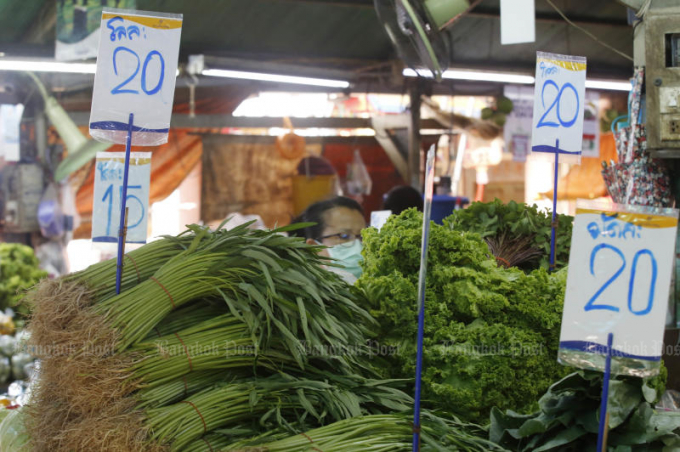June 14, 2025 | 13:14 GMT +7
June 14, 2025 | 13:14 GMT +7
Hotline: 0913.378.918
June 14, 2025 | 13:14 GMT +7
Hotline: 0913.378.918

A vegetable stall in Bang Khen district, Bangkok. Photo: Apichit Jinakul
The move came amid revelations that the average Thai child consumes more than twice the recommended daily intake of sodium per day -- among the highest in the region, researchers said.
Speaking at the recent United Nations' Food Systems Summit Dialogue over Zoom, Renu Garg, a Medical Officer for the World Health Organization (Thailand), raised her concerns over the amount of sodium in an average Thai meal.
The current national nutritional guideline recommends around 600mg of sodium, equivalent to about one-tenth of a teaspoon of salt, per meal.
However, Dr Garg said common street food items such as som tum regularly contain up to 1,800mg of sodium.
Instant cup noodles contain around 1,935mg of sodium per serving, while tom yum goong may contain as much as 2,200mg of salt -- almost four times the recommended amount per serving.
"Eating too much salt is a problem, as it could lead to obesity, diabetes and hypertension -- and the trends are headed in the wrong direction," she said.
"Indeed, NCDs remain the top cause of death in Thailand each year, with as many as 400,000 deaths reported each year, which is equivalent to a death every minute."
On the other hand, she continued, the consumption of fruits and vegetables among Thais remain low.
The WHO recommends an adult to consume around 400g of fruits and vegetables each day, but the average Thai generally consumes less than 250g of greens a day, she said.
The promote a healthier diet among children and adolescents, Dr Garg said all concerned parties must work together to improve lunch offerings at schools nationwide.
One way, she said, is by increasing the serving of fruits and vegetables in school meals, before adding authorities should consider banning or restricting the sale of sugary drinks around school premises.
The government can also adopt stricter regulations on the marketing of unhealthy food and beverages, while at the same time ramping up campaigns to promote healthy diets to the public, she added.
Dr Garg said a combination of subsidies and taxes will encourage manufacturers to reconsider the amount of salt they put in their products, and perhaps incentivise them to incorporate more fruits and vegetables into their product.
Assistant CEO of the Thai Health Promotion Foundation (ThaiHealth), Pairoj Saonuam, said promoting the adequate consumption of fruits and vegetables is relevant to the nation's 13th economic and social development plan and, as such, should be placed higher on the national agenda.
"Food security is the foundation of human security and national security. Sufficient food will bring positive effects to health. Much research worldwide has also emphasised the importance of fruits and vegetables for out health, particularly in preventing NCDs," he said.
(AFP; BKP)

(VAN) Extensive licensing requirements raise concerns about intellectual property theft.

(VAN) As of Friday, a salmonella outbreak linked to a California egg producer had sickened at least 79 people. Of the infected people, 21 hospitalizations were reported, U.S. health officials said.

(VAN) With the war ongoing, many Ukrainian farmers and rural farming families face limited access to their land due to mines and lack the financial resources to purchase needed agricultural inputs.

(VAN) Vikas Rambal has quietly built a $5 billion business empire in manufacturing, property and solar, and catapulted onto the Rich List.

(VAN) Available cropland now at less than five percent, according to latest geospatial assessment from FAO and UNOSAT.

(VAN) Alt Carbon has raised $12 million in a seed round as it plans to scale its carbon dioxide removal work in the South Asian nation.

(VAN) Attempts to bring down the price of the Japanese staple have had little effect amid a cost-of-living crisis.